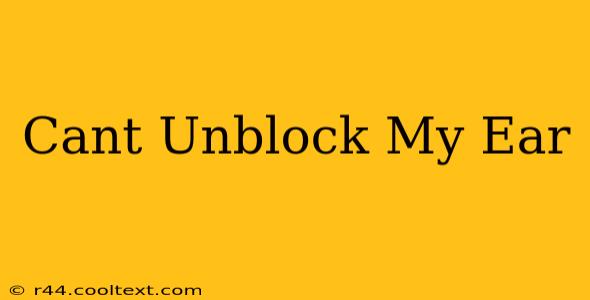Feeling that frustrating plugged sensation in your ear? A blocked ear can be incredibly annoying, making it difficult to hear properly and sometimes even causing pain. This comprehensive guide explores common causes of ear blockage, effective home remedies you can try, and when it's time to seek professional medical attention.
Understanding Ear Blockage: Causes and Symptoms
Before diving into solutions, let's understand why your ear might feel blocked. Several factors can contribute to this uncomfortable sensation:
- Earwax Buildup: This is a common culprit. Earwax naturally protects your ear canal, but excessive buildup can impede sound and cause a feeling of fullness.
- Fluid Buildup (Otitis Media with Effusion): This often follows an ear infection and involves fluid trapped behind the eardrum. You might experience a muffled hearing sensation along with the blockage.
- Eustachian Tube Dysfunction: This tube connects your middle ear to the back of your throat. If it becomes blocked (e.g., due to allergies, a cold, or changes in altitude), it can lead to pressure and a feeling of fullness in your ear.
- Foreign Object: Small objects like insects or bits of cotton can get lodged in the ear canal, causing blockage.
- Impacted Cerumen: This refers to a significant buildup of hardened earwax that's difficult to remove on your own.
- Middle Ear Infection (Otitis Media): While often accompanied by pain, this infection can also cause a feeling of blockage.
Symptoms of a Blocked Ear: Besides the feeling of fullness or blockage, you may also experience:
- Hearing loss (ranging from mild to severe)
- Ear pain or pressure
- Ringing in the ears (tinnitus)
- Dizziness or vertigo (in some cases)
- Drainage from the ear
Home Remedies for Unblocking Your Ear
Before considering medical intervention, several home remedies might help relieve ear blockage. Always use caution and avoid inserting anything sharp or potentially damaging into your ear canal.
- Yawning and Swallowing: These actions help equalize pressure in your Eustachian tubes.
- Valsalva Maneuver: Gently pinch your nostrils closed, close your mouth, and try to exhale forcefully. This can help dislodge blockages. Caution: Avoid doing this if you have high blood pressure or other health conditions.
- Warm Compress: Applying a warm, damp cloth to your ear can help soothe discomfort and potentially loosen earwax.
- Over-the-counter (OTC) Ear Drops: Some ear drops are formulated to soften earwax, making it easier to remove. Always follow the instructions carefully. Do not use ear drops if you suspect a perforated eardrum.
- Steam: Inhaling steam can help moisturize the nasal passages and potentially alleviate Eustachian tube dysfunction.
When to See a Doctor
While home remedies can be helpful, it's crucial to seek professional medical advice if:
- Your ear pain is severe.
- You experience sudden hearing loss.
- You have discharge from your ear.
- You suspect a foreign object is lodged in your ear.
- Home remedies haven't provided relief after several days.
- You have a fever.
- You experience dizziness or vertigo.
A doctor can perform a thorough examination, identify the underlying cause of your blocked ear, and recommend appropriate treatment, which may include ear irrigation, medication, or other procedures.
Disclaimer: This information is for general knowledge and does not constitute medical advice. Always consult a healthcare professional for any health concerns. Self-treating can be risky; professional medical attention is crucial for proper diagnosis and effective treatment.

